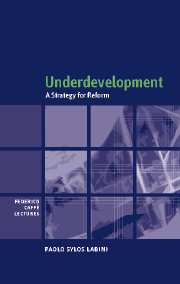Book contents
- Frontmatter
- Contents
- List of figures and tables
- Introduction
- 1 Economic development in a secular perspective
- 2 Culture, institutions and resources
- 3 The inadequacy of mainstream economics to explain development processes: returns and prices
- 4 The inadequacy of mainstream economics to explain development processes: distribution and growth
- 5 Economic relations between developed and underdeveloped countries
- 6 Demographic pressure and the countries of increasing poverty
- 7 Dependent workers, employment and unemployment
- 8 Organizational and institutional innovations
- 9 The problem of corruption
- Conclusion: a strategy for reform
- Bibliography
- Index
9 - The problem of corruption
Published online by Cambridge University Press: 22 September 2009
- Frontmatter
- Contents
- List of figures and tables
- Introduction
- 1 Economic development in a secular perspective
- 2 Culture, institutions and resources
- 3 The inadequacy of mainstream economics to explain development processes: returns and prices
- 4 The inadequacy of mainstream economics to explain development processes: distribution and growth
- 5 Economic relations between developed and underdeveloped countries
- 6 Demographic pressure and the countries of increasing poverty
- 7 Dependent workers, employment and unemployment
- 8 Organizational and institutional innovations
- 9 The problem of corruption
- Conclusion: a strategy for reform
- Bibliography
- Index
Summary
The reform of public administration, corruption and the three types of districts
The reform of public administration appears to be the precondition of any reform. In the epoch of colonies, it was in the interest of the dominating power to organize a highly centralized administrative system more efficiently to control the colony, militarily and economically. With the decolonization process no important change has occurred in the organization of public administration, except that the white colonists have been substituted by natives. But the new bosses are no better than the previous ones; in a sense they are worse, since the abuse of the latter found limits in the colonial offices of their mother country. True, the abuses committed by the central governments of the colonial countries were very serious and corruption was widespread. But the hope was that, with independence and self-government, the cases of corruption would diminish. This has not been so.
Before discussing the present-day situation, it is fitting to recall that in India corruption assumed appalling dimensions during the eighteenth century, owing also to the disastrous influence of the East India Company, which was closely connected with the British political authority, a corruption that was infecting the mother country as well. But towards the end of that century there occurred a reaction, led by Edmund Burke, which quickly reversed the trend, both in India and in Great Britain and from this point of view the situation improved in both countries, especially in Great Britain (Adonis, 1997).
- Type
- Chapter
- Information
- UnderdevelopmentA Strategy for Reform, pp. 172 - 182Publisher: Cambridge University PressPrint publication year: 2001

